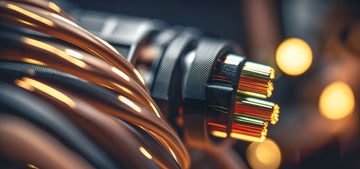Articles
Cable
There is a high price to pay for using low-cost cables
The proliferation of low-cost cables with dubious origins and cheaper price tags has led to a dangerous situation in the country where mission critical security and CCTV systems are being compromised through the use of sub-standard cabling. This is a problem that is growing and extending beyond the black-market to security equipment wholesalers and distributors of security products who are unaware of the extent of the problem in South Africa. Apart from harm the cheap imports do to the suppliers of quality cabling in South Africa, the inferior cable is also likely to cause failures and false alarms with most unable to stand up to the rigours of modern-day security installations. So says security equipment specialist, Greg Pritchard, director of GSS Group, who has more than 30 years’ experience in the specification of security devices and cabling for the country’s top security firms. He adds that although there is no standard for security cabling in South Africa, there are generally accepted standards that have been proven over the years to meet local requirements for quality and are available at a price that is acceptable for the local market.

Digging deeper
He continues that the company has run several investigations on cables available in South Africa and “you will be surprised” at the extent of inconsistency in lengths supplied and thickness variance of the cables when measured with a micrometre. Another investigation carried out by Greg and the team from GSS Group found that the company’s CCA .5mm six core cable measures a resistance of just 13.6ohms while other suppliers cable measured 21.2ohms. This is not to mention the make-up of the actual raw cable or CCA as well as the PVC coatings and sheaths which can also have an effect on the quality. Buyers do however have the ability to turn the situation around by carrying out random and regular checks to ensure the cable is still within standard. That means using a micrometre to measure thickness, multimeters to measure resistance and a heat source, in some instances, to check flammability of the products. Another trick is to weigh it as this will show if it has the correct copper mix as well as the right diameter and length.
Affordable solution
“In recent years the industry has shifted away from pricey copper to the more acceptable high quality Copper Clad Aluminium (CCA) that meets requirements for resistance or thickness and number of strands that allows for least resistance for longer runs. These high-quality cables usually have adequately thick PVC for durability and to prevent over-elongation. Unfortunately, the move also ushered-in an opportunity for some suppliers to capitalise with inferior products. “Now it is time for specifiers, security installers and even end-users to take note of what they are buying and not just relate it to price. Buyers need to make sure they are paying for what they get, because factories that do not have rigid manufacturing standards also have a lack of consistency and what you buy today may vary from what you get tomorrow. “Most security cables comes from the East and unfortunately internet buyers of products don’t always know what they are buying. The cable we sell, for example, is manufactured in a high-quality facility, is regularly audited by us and we run stringent quality checks and batch sampling. This ensures that the finer details are perfectly made for South African conditions and this extends as far as presentation, labelling and consistency and lengths,” says Greg.
Conscientious supply
“That is why it pays to use quality cables from reliable suppliers that understand the market and can specify the manufacture of cables that are suitable for our unique requirements. The savings come with the smooth operation of systems without comebacks and callouts relating to failures. “With the establishment of GSS Group five years ago, it has been my passion to provide quality products for South African conditions. As a result, we uphold the strictest standards with special attention paid to local requirements and operating environments. This also extends to CCTV and ensures that the factory produces only high-quality foamed PE with foil and 90 percent braid to shield and improve the quality of transmission. “On the electronic and electrical side, the company also applies similarly rigid industry specific standards for its LAN, CAT5, CAT6, CAT7, CAT5 UV outdoor protected and HT cables. We even take care of the small details that are important to installers like thicker carton boxes, winding and shrink-wrapping cables in the correct position and having labels that are positioned to prevent installers losing them on site. In order to ensure the highest safety, our cables are also made from low flame materials,” Greg concludes.


